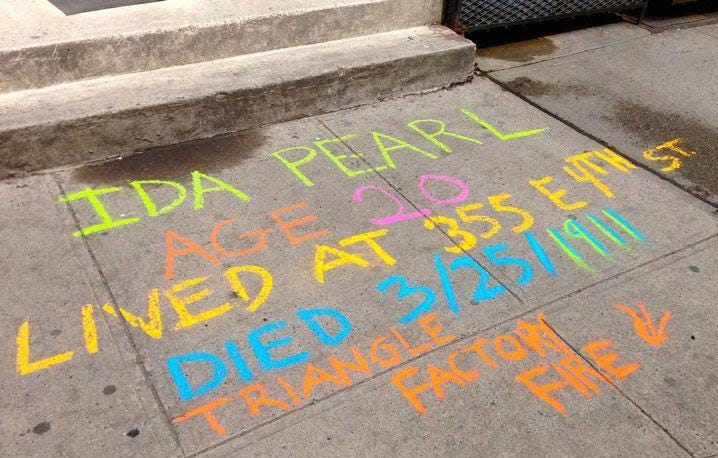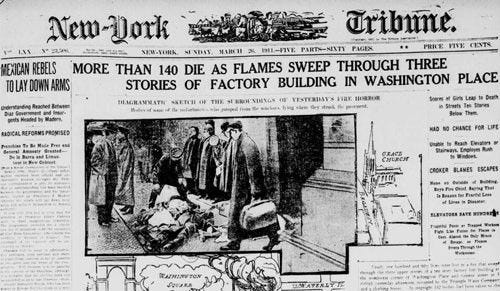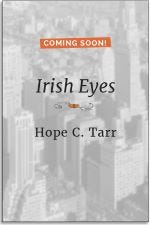They called them the Shirtwaist Kings. Max Blanck and Isaac Harris, themselves Jewish immigrants from Eastern Europe, owned the Triangle Shirtwaist Company, one of the largest ready-made clothing manufacturing concerns in the United States and a principal provider of ladies' button-up blouses, the go-to garment for the twentieth century’s New Woman.
To the workers employed in their factories in Syracuse, Yonkers, Boston, Philadelphia and Manhattan, Blanck and Harris were more than kings. They were as good as gods, wielding the power of life and death over hundreds of employees, mostly immigrant women and girls like Annie Doherty from Ireland and Celia Walker from Poland, the subjects of “The Triangle Fire of 1911: An Emmigrant’s Experience,” my three-part podcast series on the fire, a collaboration with Fin Dwyer’s Irish History Podcast.0
I’ve been drawn to the fire site, now the Brown Building, part of New York University, since attending the moving 2011 commemoration event to mark the fire’s 100th anniversary. But it wasn’t until much later when I sat down to write my historical fiction novel, IRISH EYES (coming December 2023), that I did a research deep dive into the event, interviewing firefighters, visiting the amazing New York City Fire Museum at 278 Spring Street (go — it’s worth a visit and then some!), and reading book upon book analyzing the fire and why it turned so deadly so quickly. (Along with building code safety violations, the fire equipment from the previous century was ill equipped to respond to a 10-story building, what in 1911 was considered a “skyscraper”).
In IRISH EYES, Rose’s young niece, Nora and her friend, Mrs. Katz’s daughter, Lilith are employees of the Triangle on the Saturday of the fire. Rose and Mrs. Katz take a taxi to the fire scene where they wait in adjacent Washington Square Park along with reporters, police, and hundreds of other fearful families. In the book, Nora and Lilith are among the fortunate survivors. In real life, many families had to stand by as their girls faced an horrific choice: remain in the building and burn or leap from the windows. Many who chose the latter jumped in pairs, holding hands for courage, only to break through the fire nets stretched out to receive them.
Though the Shirtwaist Kings were exonerated in their lifetimes, the public outcry against their negligence would fuel a heretofore unprecedented nationwide labor reform effort led by the International Ladies Garment Workers Union. For the first time in US labor history, women didn't have to beg a seat at the bargaining table. They were leading the charge. 110 years later, we have these fiercely dedicated women to thank for fire drills and most other legally mandated workplace safety measures we take for granted today.
For a deeper dive into the fire, read my article published in THE IRISH TIMES. And enjoy the podcasts!
Episode One follows Annie's and Celia's harrowing transatlantic journeys to New York where both women would make their home, Annie in the notorious West side neighborhood of Hell's Kitchen, Celia in the predominantly Eastern European Lower East Side.
Episode Two follows Annie and Celia from the citywide garment workers strike of 1909 to that fatal Saturday, March 25, 1911 when the fire broke out on the factory's eighth floor. Within 30-minutes, 146 workers would be dead, another 78 injured, victims of what would be the deadliest industrial disaster in New York State until the 9/11 terrorist attack.
Episode Three looks at the legacy of the fire in the lives of survivors and the larger landscape of labor reform. One of the women, Celia, will attend the 50th memorial ceremony while, in Albany, politicians debate rolling back many of the hard won workplace reforms.
For Sharing on Social:
The Triangle Shirtwaist Factory Fire: An Emigrant's Experience
https://tinyurl.com/yxhn6a66
#HistoryMatters #podcast

If you’re not yet subscribed to this free newsletter, you can fix that here!
Sharing is caring. Share today’s History With Hope newsletter and the previous ones with fellow history lovers.
IRISH EYES, Book 1 of Hope’s new American Songbook series, spans twenty-five years of Gilded Age through the Jazz Age Manhattan, as seen through the eyes of spirited Irish-born Rose O’Neill. Read more here.





